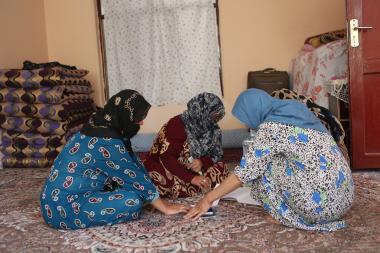Instead of bringing the peace these talks promised, President Trump’s sudden public condemnation and halt is leading to a surge in violence, threatening not only negotiations but the safety of the country’s women.
Just ahead of an already fragile and fraught presidential election in Afghanistan – which now coincides with many local elections – people across the country brace themselves. And as we know from our work at Women for Women International, women pay the cost in conflict.
Violence impacts the public life of Afghanistan’s women. As conflict claims the men in their family, women shoulder the burden of finding ways to support the family financially. For the many women in Afghanistan already living within gender lines, conflict limits their movement and ability to help loved ones: They cannot access resources for their family, healthcare, and education if they fear leaving their homes.
That affects attendance for Women for Women International classes, too. While women may face gender-based violence around the country and conflict affects many parts of Afghanistan, much of the current conflict is focused on Kabul, the capital city.
Our team continues to monitor the safety and security of our women. We advise participants to stay home if outside conditions make it too dangerous to trek to class.
But there can still be long-term consequences: Attacks can inflict stress and have mental side effects for the community. Conflict also makes it that much harder for women to get the skills, knowledge, and tools they need; harder for them to stay in the program; and affects their journey towards finding their own voice and power.
A rise in conflict from the peace deal fallout threatens democracy in Afghanistan. In elections last fall, more than 400 women ran for political office. Even more turned out to vote: A record 33 percent of those who cast a ballot October 2018 were women. That means 1 out of 3 voters was a woman.
Women should have a voice in the direction of their country – but how many of them will be silenced and stay home out of fear of already rising violence?
Just as Afghanistan’s women were overlooked during peace talks, their plight is poised to be ignored once more. The situation in Afghanistan is bigger than political insult. The future of its women, their power and the promise of peace hangs in the balance. We must do what we can to support them.
A peace deal can still be put back on the table. And this time, let’s ensure women have seats at it.

